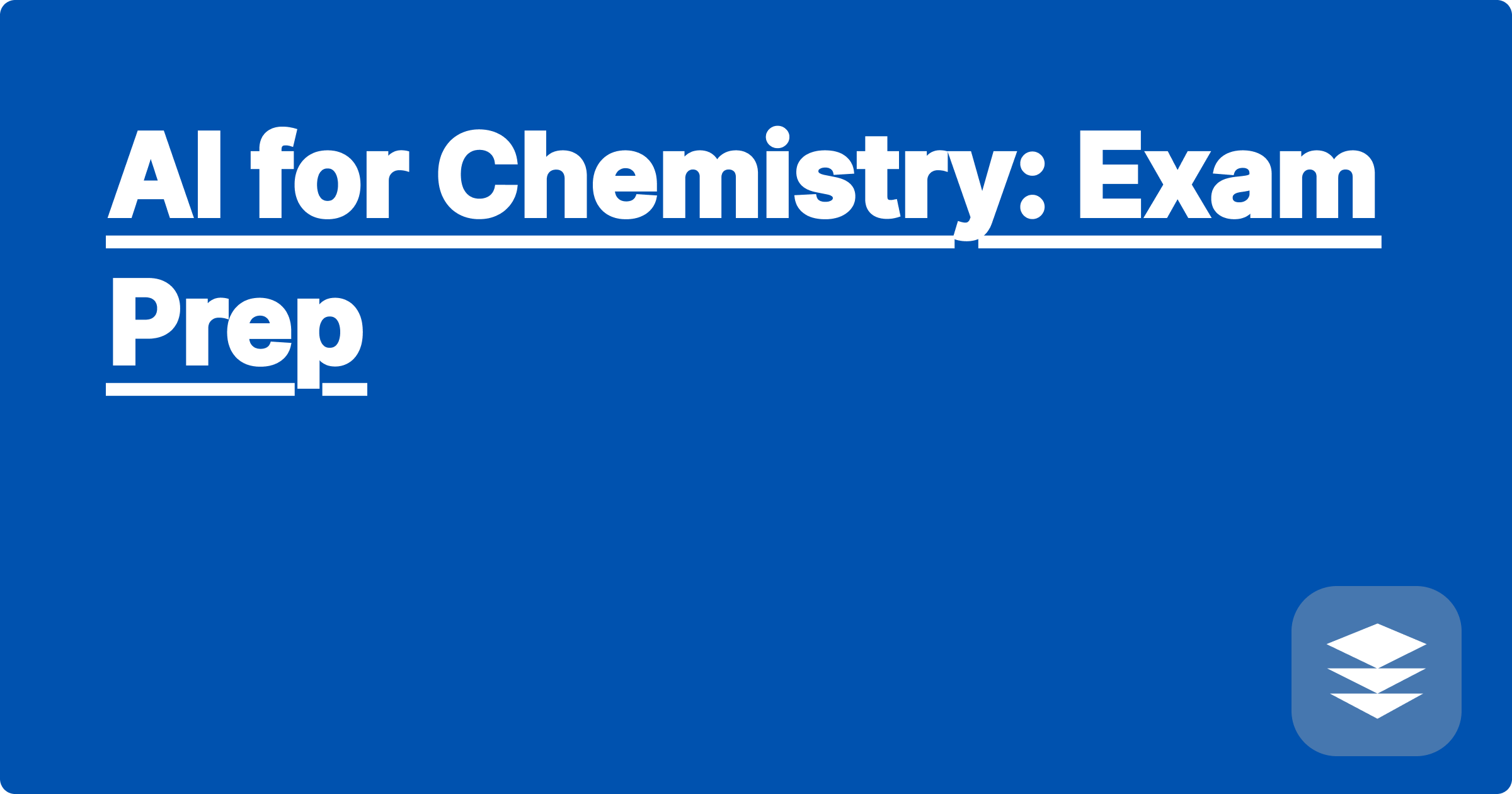
The demanding nature of STEM education, particularly in fields like chemistry, presents a significant challenge for students and researchers. Grasping complex concepts, memorizing intricate reactions, and applying theoretical knowledge to practical problems can be overwhelming. Fortunately, the rise of artificial intelligence offers powerful new tools to navigate these challenges, providing innovative solutions for exam preparation and deeper understanding. AI can act as a personalized tutor, offering tailored explanations, generating practice questions, and even simulating lab experiments, ultimately enhancing the learning experience and boosting academic performance.
This shift towards AI-powered learning is not just a fleeting trend, but a fundamental change in how STEM education can be approached. For students, AI can bridge knowledge gaps, reinforce understanding, and provide personalized feedback, leading to improved exam scores and a more profound grasp of the subject matter. For researchers, AI tools can accelerate literature reviews, predict reaction outcomes, and assist in complex data analysis, opening up new avenues for scientific discovery. Embracing these technologies is crucial for staying competitive in the rapidly evolving landscape of STEM fields.
Chemistry exams often require students to integrate knowledge from various sub-disciplines, ranging from basic stoichiometry to complex organic synthesis. Students need to understand fundamental concepts, memorize numerous reactions and mechanisms, and apply this knowledge to solve problems involving chemical calculations, reaction predictions, and spectroscopic analysis. This multifaceted approach to problem-solving can be daunting, especially when dealing with abstract concepts like molecular orbitals or complex reaction pathways. Furthermore, traditional study methods often rely on rote memorization, which can be inefficient and lead to a superficial understanding of the material. The sheer volume of information and the interconnected nature of chemical concepts create a significant hurdle for many students preparing for exams.
AI tools like ChatGPT, Claude, and Wolfram Alpha offer a dynamic and personalized approach to chemistry exam preparation. These platforms can provide detailed explanations of complex concepts, generate practice questions tailored to specific topics, and even simulate lab experiments, offering a more engaging and interactive learning experience. For instance, if a student struggles with understanding reaction mechanisms, they can ask ChatGPT to explain a specific mechanism step-by-step, providing a more personalized and interactive learning experience than a textbook. Similarly, Wolfram Alpha can be used to perform complex chemical calculations, predict reaction outcomes, and analyze spectroscopic data, supplementing traditional learning resources and providing a deeper understanding of the material. By leveraging the power of AI, students can move beyond rote memorization and develop a more profound understanding of chemical principles.
To effectively use AI for chemistry exam preparation, start by identifying the specific topics or concepts that require further clarification or practice. Then, formulate clear and concise questions for the AI tool, focusing on specific aspects of the topic. For example, instead of asking "Explain organic chemistry," ask "Explain the mechanism of the SN1 reaction with examples." This targeted approach will yield more relevant and helpful responses. After receiving the AI-generated explanation, review it carefully, comparing it to your textbook or lecture notes to ensure accuracy and identify any discrepancies. Next, use the AI tool to generate practice questions related to the topic. Work through these questions, using the AI to provide feedback and further explanations as needed. Finally, consolidate your learning by summarizing the key concepts and creating your own practice questions, reinforcing your understanding and preparing for the exam.
Consider a student struggling to understand the concept of Le Chatelier's principle. They could ask ChatGPT: "Explain Le Chatelier's principle with examples related to the Haber-Bosch process." The AI could then provide a detailed explanation of the principle and how it applies to the Haber-Bosch process, including the effects of changing temperature, pressure, and reactant concentrations on the equilibrium. As another example, a student could use Wolfram Alpha to calculate the pH of a buffer solution given the concentrations of the acid and its conjugate base. They could input the relevant information, such as "pH of a buffer solution with 0.1 M acetic acid and 0.2 M sodium acetate," and Wolfram Alpha would provide the calculated pH value along with the relevant equations. Furthermore, a student could use ChatGPT to generate practice questions related to specific reaction mechanisms, such as "Provide three examples of SN2 reactions with different substrates and nucleophiles." These examples demonstrate the practical applications of AI tools in chemistry exam preparation.
Integrating AI into your study routine requires a strategic approach. Don’t rely solely on AI-generated information; use it as a supplement to your textbook, lecture notes, and other learning resources. Always verify the information provided by the AI against reliable sources to ensure accuracy. Focus on understanding the underlying concepts rather than simply memorizing facts and formulas. Use AI to generate practice questions and simulate exam scenarios, allowing you to identify your weaknesses and focus your study efforts. Engage actively with the AI, asking clarifying questions and seeking further explanations when needed. Finally, remember that AI is a tool, and its effectiveness depends on how you use it. By combining AI with traditional study methods and a proactive learning approach, you can maximize your academic success.
To conclude, AI offers a powerful new toolkit for STEM students and researchers, particularly in challenging fields like chemistry. By understanding the capabilities and limitations of these tools and integrating them strategically into your study routine, you can unlock a deeper understanding of complex concepts, improve your problem-solving skills, and achieve greater academic success. Embrace the potential of AI and transform your approach to learning and research. Explore the various AI platforms available, experiment with different strategies, and discover how these powerful tools can enhance your journey through the fascinating world of chemistry.
AI Homework Help: STEM Made Easy
Ace STEM Exams: AI Study Guide
AI for Lab Reports: Data Analysis
AI: Your Physics Homework Solver
Engineering AI: Boost Your GPA